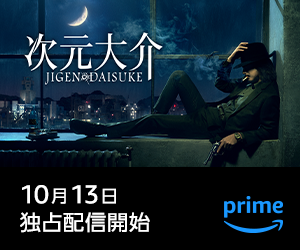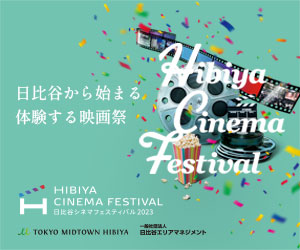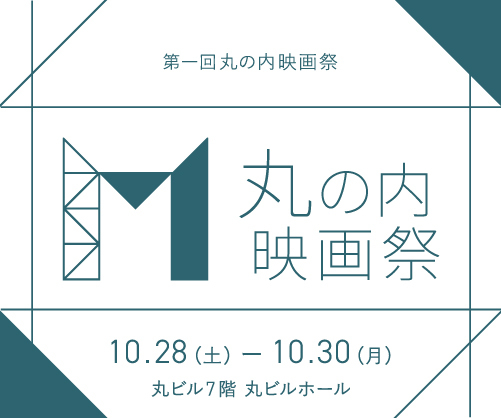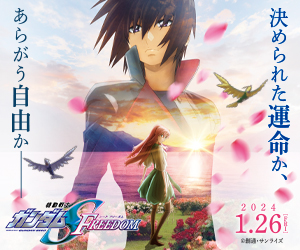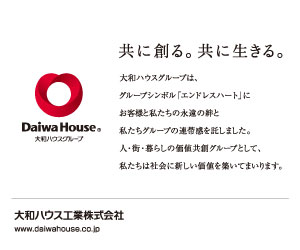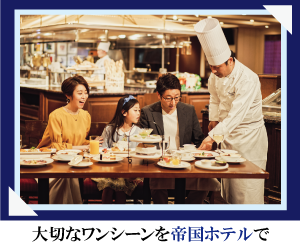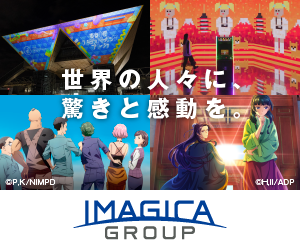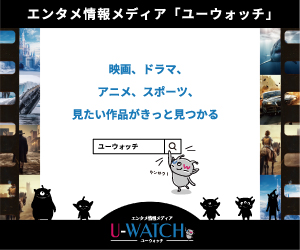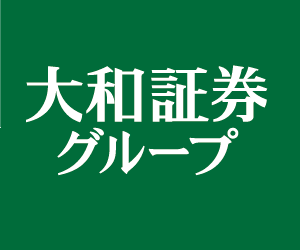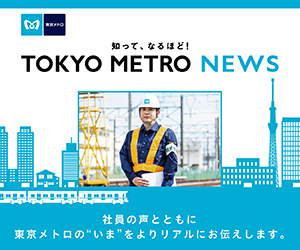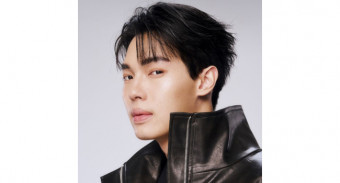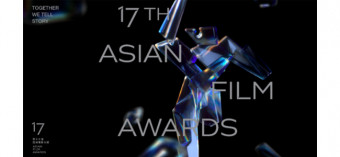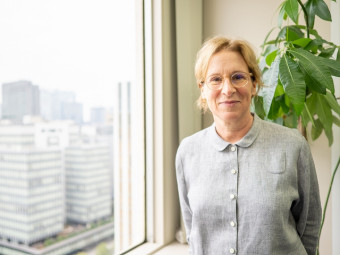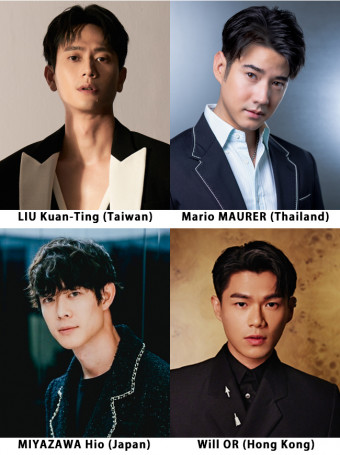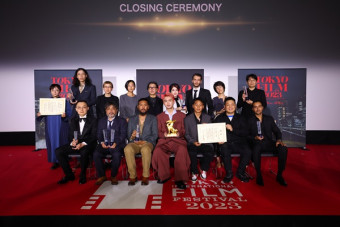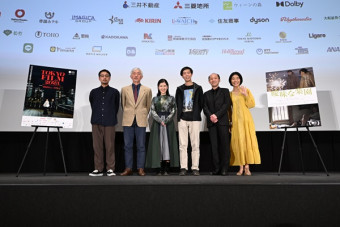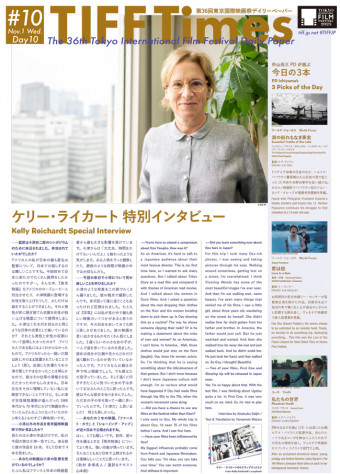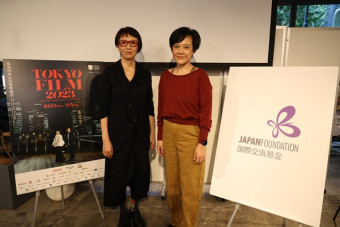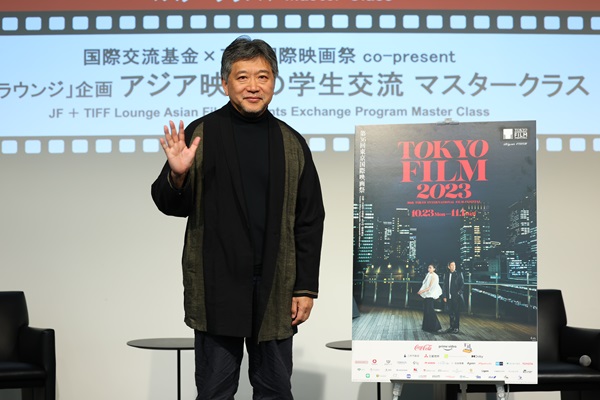
Every year, noted Japanese director Kore-eda Hirokazu participates in the Tokyo International Film Festival as a pundit and promoter of Asian cinema. As a past winner of the Busan International Film Festival’s Asian Filmmaker of the Year award, he is obviously acknowledged by his peers in Asia as one of the most important cinema figures in the region. No surprise, then, that his masterclass on October 26 was a hot ticket.
But it was also a restricted one: Kore-eda was there to discuss the future of cinema with a select group of film students from the Beijing Film Academy, the Asian Film Awards Academy in Hong Kong, and other schools in Southeast Asia and Japan. The masterclass was tantamount to a plea for coming generations of filmmakers to work together in order to realize an Asian cinematic tradition that didn’t deny their unique voices, but would also find reach ground with their fellow Asian filmmakers.
The talk opened with a clip from a TV documentary that Kore-eda made for Fuji TV in 1993 about the Taiwanese filmmakers Hou Hsiao-hsien and Edward Yang. The clip showed news footage of Hou bringing his film, The Puppetmaster, to Japan. At the press conference for the film, Hou told reporters that he made the film, which was about a traditional puppet theater artist, to teach young Taiwanese about their heritage, since, “they have no understanding of Taiwanese history or their own background.”
Yang, who was the same age as Hou, had a different approach, even though his themes often intersected with Hou’s. Yang used Hollywood techniques to tell his stories about the contemporary state of Taiwanese youth. Kore-eda was struck by the contrast: two master Taiwanese directors who endeavored to teach their fellow citizens about the place they live in, but using entirely different filmmaking approaches.
Talking about his own approach to making the documentary, Kore-eda said, “At the time I really wanted to make my own movies. But a producer for Fuji TV told me about Hou’s new film and asked me to interview him for a promotional piece. I thought that it would be a wasted opportunity, so I decided to include Yang in the documentary. Fuji TV had a generous budget at the time and gave me the approval to go to Taiwan to interview them both.”
Though Kore-eda’s immediate aim was to explain how these two directors were shaping the future of Taiwanese cinema, there was another reason for his interest: His father was born in Taiwan. “He didn’t talk much about his years in Taiwan,” said Kore-eda, “unless he was drinking.”
Consequently, Kore-eda wanted to learn more about the island that formed his father’s personality. “I visited Taiwan again in 2019,” he said, “and looked for the place where my father was born, and there are still some Japanese houses in that area. That’s why I’ve always felt a connection to Hou’s work, and through that connection I became friends with Yang.” He went on to talk about Hou’s failing health, which means he will not make any new films. Yang, of course, died in 2007. But he remembers that it was always Hou’s dream to inspire young filmmakers throughout Asia to work together on projects, and Kore-eda wants to achieve that dream in some way.
“Hou was as close to a mentor as I’ve ever had,” he explained. He showed them detailed notes and storyboards for his first feature, Maboroshi and said that although he felt he was just copying Hou, when he showed them to the Taiwanese master for his opinion, Hou told him, “How can you know all this even before you start shooting?” And so Kore-eda learned that everything will change drastically once he set foot on the set and started working with actors. It’s not that being prepared is wrong; only that he must expect the unexpected.
“The point is, your struggles as an artist belong to you,” said Kore-eda. “The films that you will someday make are already inside of you. If you watch [my Fuji TV] documentary all the way through, you’ll see Hou just sitting around smoking, waiting for the right natural lighting, and that’s for a commercial. It doesn’t mean there’s a right way and a wrong way. It just means there’s a way that’s right for you.”
During a Q&A session after his talk, Kore-eda addressed several queries that are common for him. “In Japan, people refer to me as a director who tackles social issues,” he said. “But I don’t like being pigeonholed that way. Shoplifters may have been a socially conscious film, but it wasn’t intended as such. I approach each film differently, depending on the subject and the actors.”
Two students, one from Thailand, the other from China, asked specifically about the female actors he favored. “Mizoguchi Kenji used to ask his actors, ‘Are you reflecting yourself? How responsive can you be to the other characters?’ They have to be able to listen and not just use their mouths. Ando Sakura does that very well.” As for Ayase Haruka, Kore-eda says when he first met her he didn’t have a part for her but realized that she was a “more substantial person than her image, which is that of an airhead.” But he thought she would make the perfect older sister and so cast her in his movie Our Little Sister.
He was also asked about his work with child actors, and said, “I don’t treat them any differently than adult actors. They have their own vocabulary and emotional movement, so all I do is overlay that on top of the characters I’ve written.”
In closing, Kore-eda again impressed on the students the importance of pan-Asian synergy. “I don’t have a generic view of the future of Asian films,” he said. “What I want to see is some kind of collaboration among Asian filmmakers, especially Japanese filmmakers, who lag behind in regard to such collaborations. I hope you can pave the way for this kind of future.”
TIFF Lounge
Co-presented by The Japan Foundation & Tokyo International Film Festival
Asian Film Student Exchange Program
Guest : Kore-eda Hirokazu(Filmmaker)
Moderator: Tsuchida Tamaki (Program Coordinator, Yamagata International Documentary Film Festival / Assistant Professor, Waseda University)












